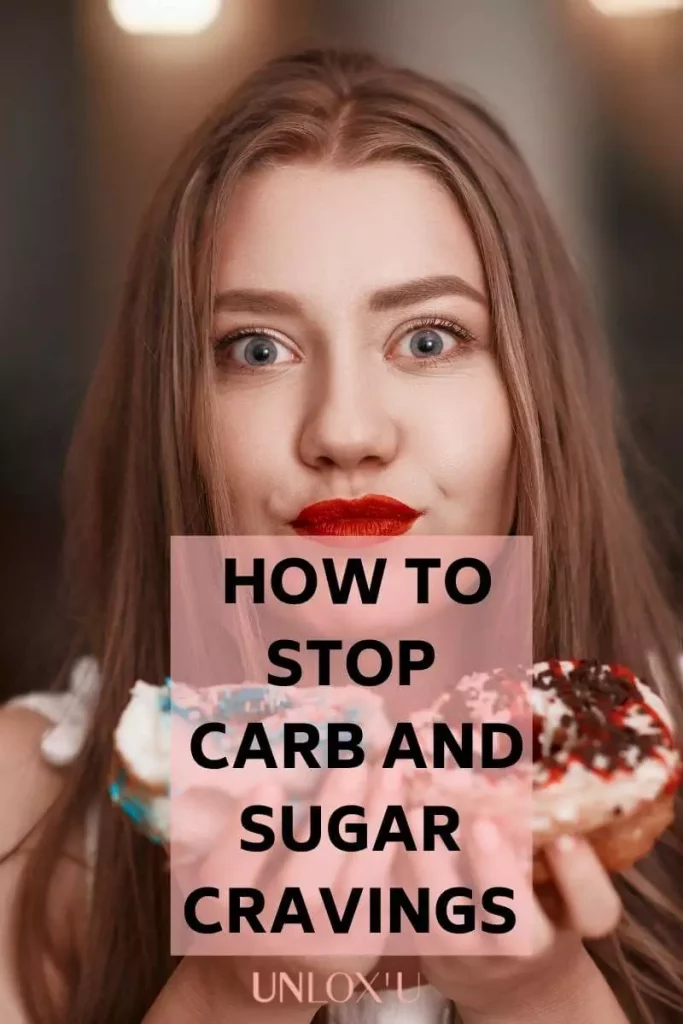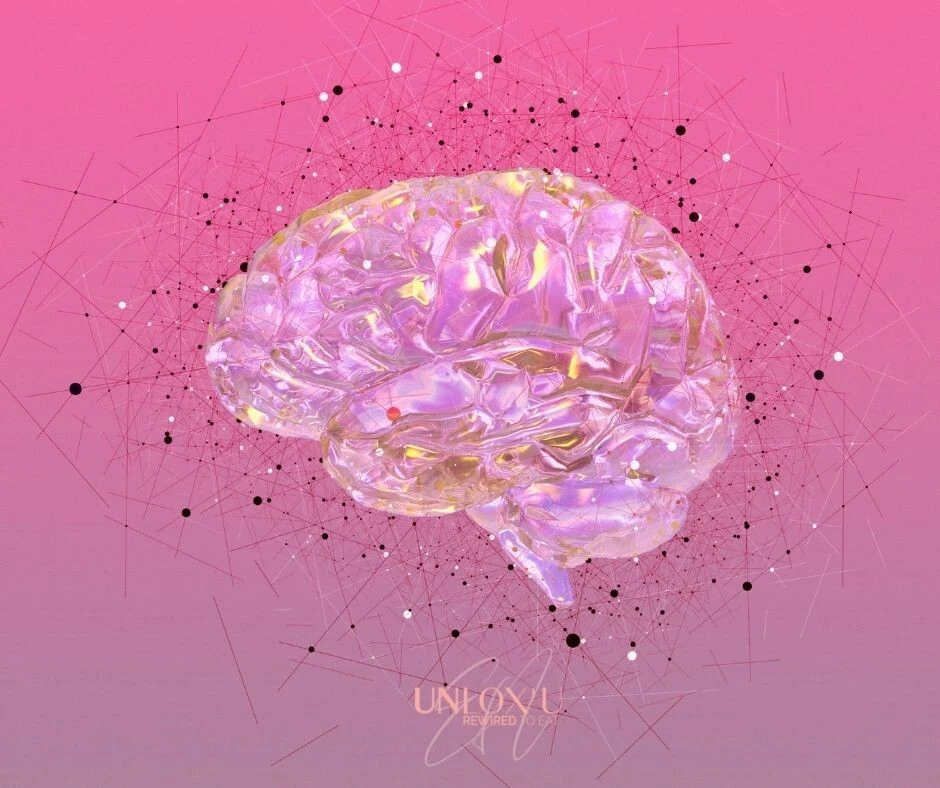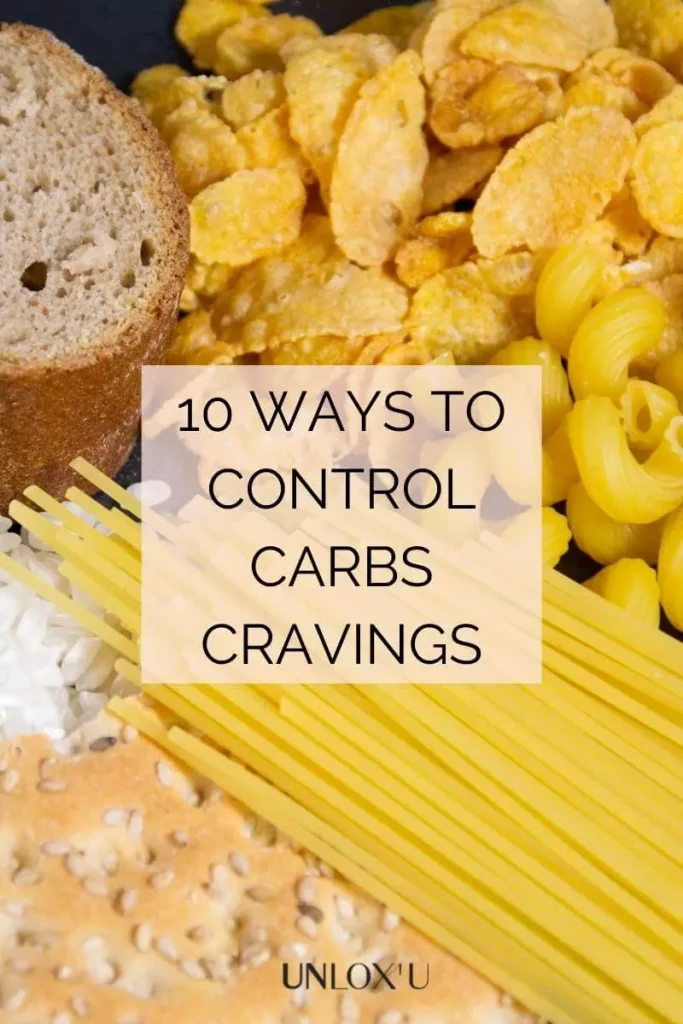Have you ever experienced sugar and carbs cravings?
Let’s admit. Sugar and carbs are very tasty. A warm toast with butter and jam, chocolate cake for dessert or a pizza as a treat after a long week, I would think that most people would enjoy some, if not all of these foods.
It gets tiring, though, when you can’t stop thinking about these foods. It’s like the mind is only focusing on food. And while they can be hard to resist, there are ways to effectively deal with them.
If sugar and carbs cravings is something you are struggling with and would like to have more control over, keep reading.
In this blog post, you will learn:
- what sugar and carbs cravings are,
- why they happen, and
- how to overcome them.

Why do we crave sugar and carbs
When a sugar craving arises, a few possible things could be going on, including:
You’re genuinely hungry.
Your blood sugar levels are too low.
Another hormone, such as cortisol, can trigger cravings due to its fat-storing nature.
In most cases, though, it comes down to the delicate insulin-glucagon balance. This refers to the intricate system in your body where insulin tells your cells to absorb glucose from the bloodstream for energy use. Glucagon counteracts insulin by instructing your liver and muscles to store glucose for later use.
You ideally want these two hormones working together seamlessly with little or no interference from other hormones that may hijack this delicate balance and trick you into thinking you’re hungry when in fact, you’re not.

So, one of the causes of carbs cravings
is when insulin levels are too high due to prolonged periods of eating carbohydrates (especially sugar and/or processed grains). As your blood glucose rises, so does your insulin level.
There’s nothing wrong with that. In fact, it’s completely natural and necessary for life!
Risks of eating too much sugar
The problem arises when this response doesn’t stop even though the glucose is already in our cells, ready for energy production.
This means insulin levels remain high, which signals your body to start storing fat. This slows down the release of stored fat by blocking lipolysis which contributes to non-alcoholic fatty liver disease. Further consequences can be interference with brain function, compromised immune function due to the reduction of white blood cells, and insulin resistance over time.
Carbohydrates are the body’s first choice of energy source. It means if your body is running on empty, it will look for anything to use as fuel. Sugar provides a quick burst of energy, however, it is not lasting. Following a blood sugar crash will lead to more cravings. This is when we are in a blood sugar cycle.
But too much sugar can lead to obesity, diabetes, heart disease and other chronic illnesses. Breaking these habits may seem difficult at first, but there are ways to overcome this challenge! Like identifying what the cause of the craving is.
Sugar and Carbs cravings explained based on biology, psychology and physiology:

BIOLOGICAL REASONS FOR SUGAR CRAVINGS
There are a number of biological reasons why people crave sugar and carbohydrates.
Brain reward / Pleasure System
Our brain is wired to seek pleasure and reward and avoid pain. We will naturally seek out activities that create pleasure. Food stimulates the reward system in the brain which releases the feel-good hormone dopamine. Carbohydrates also stimulate the release of serotonin, which can make you feel happier and more relaxed. This is how we start feeling “addicted” to the way food makes us feel. Even just looking or thinking about food releases dopamine and drives our motivation to eat until this need is satisfied. This is why we can’t stop thinking about yummy food until it’s gone.
Being aware of how we respond to food and what drives our decisions, we can take the power back and regain control again.
Additionally, when you eat sugar or carbs, your body releases insulin, which causes your blood sugar to rise. This triggers the release of Ghrelin, a hunger-stimulating hormone, causing you to eat more.
Hunger
This one might seem obvious, but sometimes our stomachs can trick our brains into thinking that we need food even when we’re not really hungry. If you find yourself frequently snacking throughout the day, try to take a break from eating for a few hours before deciding if you’re actually hungry or not. Often, we snack because we’re bored or because the foods are readily available, not because we’re actually hungry.
Diets and Restrictions
Almost every restriction is followed by overeating or binge eating.
A common scenario is an afternoon, night and weekend overeating episodes. Often this can be the consequence of not eating enough calories during the day/week and restricting certain foods or food groups.
When calories are reduced throughout the day, intentionally or unintentionally, our bodies will try to find a way to catch up. The brain will fixate on opportunities to get food until this need is satisfied. Food will become more appealing than usual to a point of obsession and a high drive to consume food.
Food rules create psychological and perceived restrictions which make “forbidden” food more appealing. The more we avoid eating food we actually enjoy, the more this food will control us. By integrating this food regularly into our diet, it loses its grip on us.
PSYCHOLOGICAL REASONS FOR SUGAR AND CARBS CRAVINGS
In my TEDx talk, I talk about Using Food as a Drug of choice. For some, food is a coping mechanism, it’s a way to self-medicate. Others might be using these as a way to cope with stress or other negative emotions. Alternatively, some people might crave because they’re addicted to these foods (more so, the way this food makes them feel). They’ve developed a dependence on sugar/carbs, and they find it difficult to resist cravings for them.
Here are some of the psychological reasons:
Withdrawal symptoms
Carbs provide a temporary high, which can be addicting. Sugar makes us feel happy and is often used as a coping mechanism for stressful situations. When we stop eating sugar or carbs, our moods change. We may crave them to maintain the feeling they usually give us.
Boredom
We often look for comfort foods like cookies and cake when we get bored. These types of snacks are not only delicious but also familiar to us. It’s important to switch up your snacking routine or find other outlets that can keep you occupied when you feel bored, such as finding an activity that is fun and engaging.
Emotional eating
If you eat in response to stress, anxiety or depression, breaking the habit will take time and effort on your part. You’ll need strategies for coping with uncomfortable emotions without using food as a crutch or reward system. Remember that some emotional problems require professional help, so you don’t have to deal with them alone. We can supply support during the challenging process of overcoming emotional eating.
Tiredness
When we’re tired, we might reach for unhealthy snacks like candy bars or chips because they give us an instant burst of energy. However, this type of energy is short-lived, and you’ll likely feel more tired after eating them. It would be better to get enough sleep every night, so you don’t feel the need to reach for unhealthy foods when you’re feeling run down.
There are other psychological reasons why people crave sugar and carbohydrates. Some of these reasons are habits, beliefs, self-sabotage, daily routine and even our own body image. If you’re struggling to overcome sugar and carb cravings, it’s essential to identify the root of the problem so you can develop strategies to address it head-on.
Strategies for overcoming cravings vary from person to person but could include:
- Seeking professional help with Unlox’U clinic
- Changing your diet to reprogram your appetite
- Finding healthy snacks to keep on hand
- Getting enough sleep every night
With time and effort, you can overcome your cravings and be on your way to a healthier lifestyle.
There can be many physiological reasons why you might be experiencing sugar and carbohydrate cravings. For example, if you’re not getting enough protein, your body might crave carbs to give you an energy boost. Alternatively, if you’re not getting enough vitamins or minerals, your body might crave sugary foods as a way of providing those nutrients. At a very basic level, the body will crave sugar when it needs energy. Glucose from stored sugar in the liver is converted to fat when there is an over-abundance of insulin in the blood.
In addition, when the pancreas detects a blood sugar fluctuation, it triggers a response that produces more glucose from stored glycogen in the muscles and liver.
PHYSIOLOGICAL REASONS FOR CRAVINGS
There can be many physiological reasons why you might be experiencing sugar and carbohydrate cravings. For example, if you’re not getting enough protein, your body might crave carbs to give you an energy boost. Alternatively, if you’re not getting enough vitamins or minerals, your body might crave sugary foods as a way of providing those nutrients. At a very basic level, the body will crave sugar when it needs energy. Glucose from stored sugar in the liver is converted to fat when there is an over-abundance of insulin in the blood.
In addition, when the pancreas detects a blood sugar fluctuation, it triggers a response that produces more glucose from stored glycogen in the muscles and liver.
Blood sugar Fluctuation
When you’re low on glucose in your bloodstream, you might feel tired and hungry for sweets and carbs because they will give you the extra energy boost that you need to get through the day with fewer hiccups. It’s important to eat balanced meals that contain protein and whole grains so that you don’t experience these cravings when your blood sugar drops too low.
Current Food choices
A lot of the food we buy at the supermarket contains additives, flavour enhancers, high fructose corn syrup, sugar, colourings, etc. By enhancing the flavour our taste buds get used to stronger flavours. When highly palatable food such as high in salt, fat and sugar is the main diet, natural food can be bland.
Enhanced flavours impact the Brain Reward and Pleasure centre which can make us feel less in control and lead to overeating or compulsive eating. We don’t experience an addictive behavioural response to naturally occurring foods like strawberries or grapes. Food also changes our gut flora and what we crave (see Gut Bacteria).
Therefore, our current food choices will have an impact on the type of food we desire. Knowing that, we can navigate what we eat and what we crave.
Blood sugar Fluctuation
When you’re low on glucose in your bloodstream, you might feel tired and hungry for sweets and carbs because they will give you the extra energy boost that you need to get through the day with fewer hiccups. It’s important to eat balanced meals that contain protein and whole grains so that you don’t experience these cravings when your blood sugar drops too low.
Gut Bacteria
Different bacteria in our gut craves different things: yeast craves sugar, bacteroidetes enjoy fat, prevotella love carbs and bifidobacteria are fibre fiends. They each have their own way of signaling their favourite food by influencing our food choice and asking for their favourite meal. Microbes really know how to mold our cravings and unfortunately, they are not always in our favour. Refined modern foods pose a problem for the gut, as they tend to shift bacterial growth in unfavourable ways.
One particular study even found that people who were overweight had a lower presence of a gut bacteria species called Bacteroidetes, whereas those who were leaner had higher numbers of the species.
When our microbe is healthy, people naturally choose food that is difficult to over consume due to the satiating quality of these foods. Altering your gut bacteria profile can improve your energy, appetite, mood and how your clothes fit. With a few small changes, it is possible to “reset” your gut bacteria so they are far more supportive of your health.

How to control sugar and carbs cravings
Wow, that’s a lot! So, what can we do to be in control of our cravings? Carb and sugar cravings can be tough to control. You might think that the only way to stop your cravings is by eliminating all carbs and sugars from your diet. However, this can lead to a lot of other problems, such as binge eating and overeating.
There are some ways you can decrease these cravings without going cold turkey on those sweet treats. Here are ten great tips for controlling those carb and sugar cravings!

1. IDENTIFY WHAT CAUSES YOUR CRAVINGS
One of the best ways to start overcoming carb and sugar cravings is to identify what is causing them in the first place. This can be done by keeping a food diary for a week or two, where you track everything you eat and drink as well as noting when you experience cravings. Once you have a good idea of what your triggers are, you can start working on addressing them. To discuss your case with a specialist, book a call with us.
2. WRITE DOWN THE THINGS YOU CRAVE AND WHY
Identify the things and situations that are causing you to eat without thinking about how it will make your stomach feel or if it’s the best choice for you.
Quote: The more you understand about yourself, the easier it will be to break old habits and, most importantly, create better ones
Writing down what you want is a good way to approach cravings. Sometimes when we don’t face our feelings head-on, they keep poking us until we can’t stand it anymore! So write them out, and write out a plan for how you’re going to get what you need.
3. TAKE A CLOSER LOOK AT YOUR DIET
When you’re trying to stop sugar cravings, it’s important to take a closer look at your diet to see if you’re getting enough protein and healthy fats. These nutrients can help to reduce cravings and keep you feeling satisfied throughout the day.
4. TRY DIFFERENT FOODS THAT ARE HIGH IN PROTEIN
It’s so important to discover meals that can help you control your cravings when you’re trying to reduce carbohydrates and sugars. One way to do this is to try different foods that are high in protein. This could include eggs, salmon, or nuts. Eating more nuts can also help you to get those healthy fats into your system, which can help to reduce cravings.
5. GET ENOUGH SLEEP
Another way to control sugar cravings is to make sure you’re getting enough sleep. When you’re tired, your brain isn’t functioning as well, and it’s more difficult to resist cravings. Make sure you’re getting at least 7-8 hours of sleep each night.
If you’re having trouble sleeping, try some of these tips:
- Create a bedtime routine that includes winding down for 30 minutes before sleep
- Use a noise machine or earplugs to block out noise
- Avoid watching television or working on the computer in bed
- Limit caffeine and alcohol intake before bed
- Stretch or meditate to relax the muscles
- Get up at the same time every morning, including at weekends
6. DRINK MORE WATER AND LESS SODA, MILK, COFFEE, TEA AND ALCOHOL
By drinking beverages such as juice, soda, milk, coffee and tea, you’re actually consuming many calories. And while these drinks do contain nutrients, they also have a lot of sugar. In fact, most of the calories in these drinks come from sugar. Alcohol is another source of sugar. A single glass of wine can contain as many as six teaspoons of sugar.
7. EXERCISE REGULARLY TO RELEASE ENDORPHINS
Endorphins are hormones in the brain associated with feeling good. When you exercise intensely or for a long period of time, your body releases endorphins, which make you feel better about yourself and the way your body looks. It’s also important to establish when you are most likely to go on a binge when it comes to sweets or carbs, then a meal plan for that particular time frame. Put healthy snacks around in that case so that when you start craving something sweet or starchy, you will have the healthy choice instead.
8. CREATE A LIST OF THINGS YOU LIKE ABOUT YOURSELF
Why? Because when those carb or sugar cravings hit, you can remind yourself of the positive qualities in your life. Sometimes, our thoughts can be detrimental to ourselves. We constantly focus on the negative things that happened in our day, our mistakes, or what people said about us. I want you all to know that there are other ways to think, and it’s okay if you don’t like everything about yourself because everyone has their flaws.
Once you begin building up your list of good qualities, not only will this make you more confident, but it will most likely become a key aspect of who you are as a person. Having good qualities will make you feel better about yourself and help with your self-esteem. Don’t be afraid to try new things, even if they might seem silly or weird!
Just remember that you are amazing and wonderful exactly how you are.
9. TAKE DEEP BREATHS THROUGHOUT THE DAY TO MANAGE STRESS LEVELS
Taking a few deep breaths can help you relax when you’re stressed. Not only will this help you to relax, but it can also help to clear your mind. This will help to lower your stress levels and serve as a decrease factor for your carbs and sugar cravings.
10. BE MINDFUL OF HOW MUCH SUGAR IS IN THE FOOD YOU EAT
For sugar cravings, being mindful of how much sugar is in the food you eat can make a big difference. Many people don’t realize just how much sugar they consume on a daily basis. For instance, did you know that a can of cola has about 10 teaspoons of sugar?
That’s more than the amount of sugar in a candy bar!

If you would like to stop sugar and carbohydrate cravings, we are here to help. Our Program is an effective way to control these cravings, as it provides the step-by-step guide you need for improved moods, reduced inflammation, better sleep quality, increased energy levels, and weight loss results – all while satisfying your appetite with delicious foods that are actually good for you! If you’re ready to kick those food cravings once and for all, book your free call today. We’ve helped hundreds of other women control their sugar and carbs cases. Let us help YOU too!
FREE GUIDE REVEALS
How To Overcome Food Cravings & Overeating
and transition into full control of your appetite.
Discover the 13 elements to effectively address the individual factors of our hunger and food choices so healthy eating becomes effortless.




